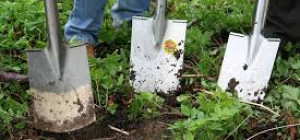 Gardening is not only relaxing, but it can be easy on the pocket too. With the right type of space, skills and desire, you can have an entire grocery store growing right in your backyard. It gives your compound a lovely ‘nature’ look and you know for a fact that your family is getting the freshest tomatoes, potatoes, onions and kale that nature can offer. It is a wonderful way to live. It’s a healthy way to live. The problem is, you are not the only who thinks that. Little furry creatures like rabbits, woodchucks, gophers and even large ones like deer think that too. They love the fact that you have taken the time to grow such wonderful crops in your back yard. They simply cannot believe how generous you are by leaving it right there for them to find and eat. This is the problem most gardeners face. Rodents and pests. These unwanted animals eat all your crops, burrow through your garden and render months of work completely useless. But do not despair, there are ways to safeguard your garden against them. Here are 5 Tips to Safeguard Your Garden Against Animals.
Gardening is not only relaxing, but it can be easy on the pocket too. With the right type of space, skills and desire, you can have an entire grocery store growing right in your backyard. It gives your compound a lovely ‘nature’ look and you know for a fact that your family is getting the freshest tomatoes, potatoes, onions and kale that nature can offer. It is a wonderful way to live. It’s a healthy way to live. The problem is, you are not the only who thinks that. Little furry creatures like rabbits, woodchucks, gophers and even large ones like deer think that too. They love the fact that you have taken the time to grow such wonderful crops in your back yard. They simply cannot believe how generous you are by leaving it right there for them to find and eat. This is the problem most gardeners face. Rodents and pests. These unwanted animals eat all your crops, burrow through your garden and render months of work completely useless. But do not despair, there are ways to safeguard your garden against them. Here are 5 Tips to Safeguard Your Garden Against Animals.
1. Build a Fence
This is the first and the most obvious options. You should build a fence around your precious garden and around specific beds. Your best bet is to find out what type of pest you are dealing with so as to build the appropriate fence to safeguard against them. If your farm is being raided by deer for example, your best option is to build a high wire mesh fence. Deer can be very destructive. They browse through your garden sampling anything in their path. As soon as they find something they like, they concentrate and completely devastate that patch and then move on. Having a wire mesh fence around your garden should help you protect your valuable plants from these vegetarians. You have to make sure that the fence is high enough though because deer can jump. Make the fence around 8ft long and your garden should be well protected against them. Be sure to have it secured below so that the deer do not push their way through.
Rabbits on the other hand are nibblers. They will nibble on anything that holds their fancy. They are also very crafty creatures that can burrow their way under a fence and even squeeze through the meshing. Make sure that the fence you use is no larger than a single inch. This is to keep them from squeezing their way through. Also, be sure to bury the bottom of the fence deep into the ground, about 4 inches deep and bend the edge outwards. This will help safeguard against burrowing underneath your raised fence. Your fence should be raised between 18-24 inches high or simply attached to the bottom of your deer fence.
Additionally, you can use to raise beds to keep your plants from underground burrowers like gophers. Build the bed high enough to discourage jack rabbits and be sure to lay a bed of fine-meshed hardware cloth underneath it so gophers can’t burrow through.
2. Make the Garden Unattractive to Wildlife
There are some measures that you can take to make your garden less attractive to the marauding pests. For starters, you can start by eliminating all possible hiding places for littel rodents like rabbits. They are uncomfortable with wide open spaces. Try as much as you can to get rid of hiding places and they will think twice about coming onto your farm. Do not leave any access to beneath deck crawl spaces and so on. The other option is to cultivate ‘non-pest friendly’ plants. There are certain plants that have been known to discourage munching by deer, rabbits and the other pests. Plants like: papaver (poppies), daisies,narcissus, achillea, rudbeckia, agastache, coreopsis, aster, echinacea, lupine,verbascum and centaurea are all plants that are considered rodent proof.
3. Use Birds of Prey as Guard Creatures
Almost every species has its predator. For rodents, this happens to be owls, hawks and eagles. As much as it would be a long stretch to rare an eagle in your garden just for this purpose, you can encourage other birds of prey to hunt within it to eradicate or at the very least thin the rodent population. Building or erecting a number of hawk perches will help keep the daytime rodents in check by encouraging hawks to hang around your farm and hunt them down. For night time rodents like gophers, build barn owl nests around your farm. Owls hunt at night, which is when gophers come up top from underneath the ground. Having these birds of pray hanging living on your property will keep the rodent population in check and discourage newcomers.
4. Build Traps
Building suitable animal traps are one sure fire way of catching your freeloading population. Make sure to make the traps humane and safe for the animals, if only to protect yourself from animal cruelty laws and activists. Bait the traps with the local rodent populations preferred plants. Always check the traps everyday. If you are a rabbit meat fan, then this can be a source of food as well as a solution to your pest problem. If not, then find a safe release area for the captured creatures. Be sure this is far away from your home so they have a tough time finding their way back. Build traps suitable for whatever pests your garden is suffering from.
5. Sprays and Pesticides
This is also another highly viable option when it comes to pest control. Find safe anti-pest sprays such as Deer Scram and Deer Out. Always apply the spray to the plants you are not planning to eat anytime soon and do so after it rains. You can also use fermented salmon fertilizer. The awfully strong smell will discourage deer and rabbits from hanging out in your garden. This type of fertilizer can be sprayed on plants and the expected effect will be felt for a while longer than the other type of sprays. This is because salmon fertilizer has natural oils that make it repellant to rain water which often washes off the other type of fertilizer. It is additionally beneficial to to the garden plants by preventing fungal diseases like black spot and powdery mildew.
It takes just a little extra effort and your valuable garden will be well protected against your neighborhood four-legged bandits. These are 5 of the best and most effective tips to keep your garden safe.







